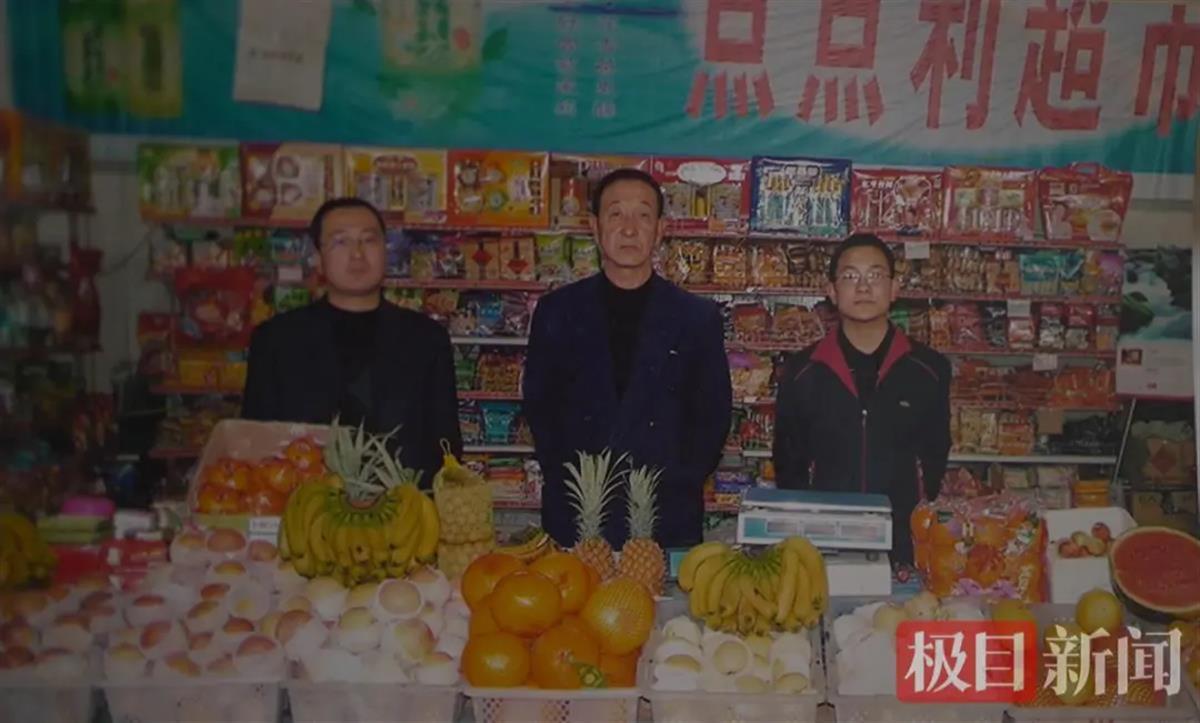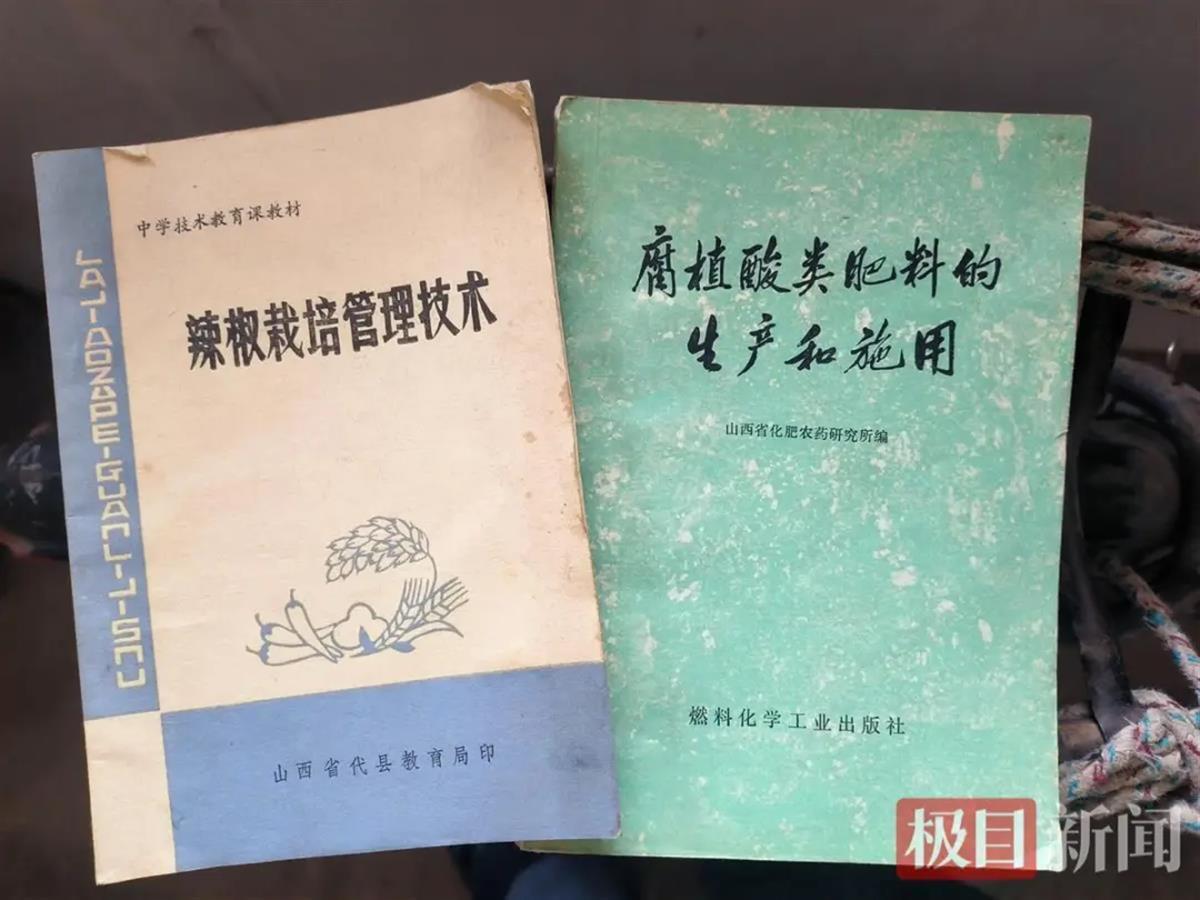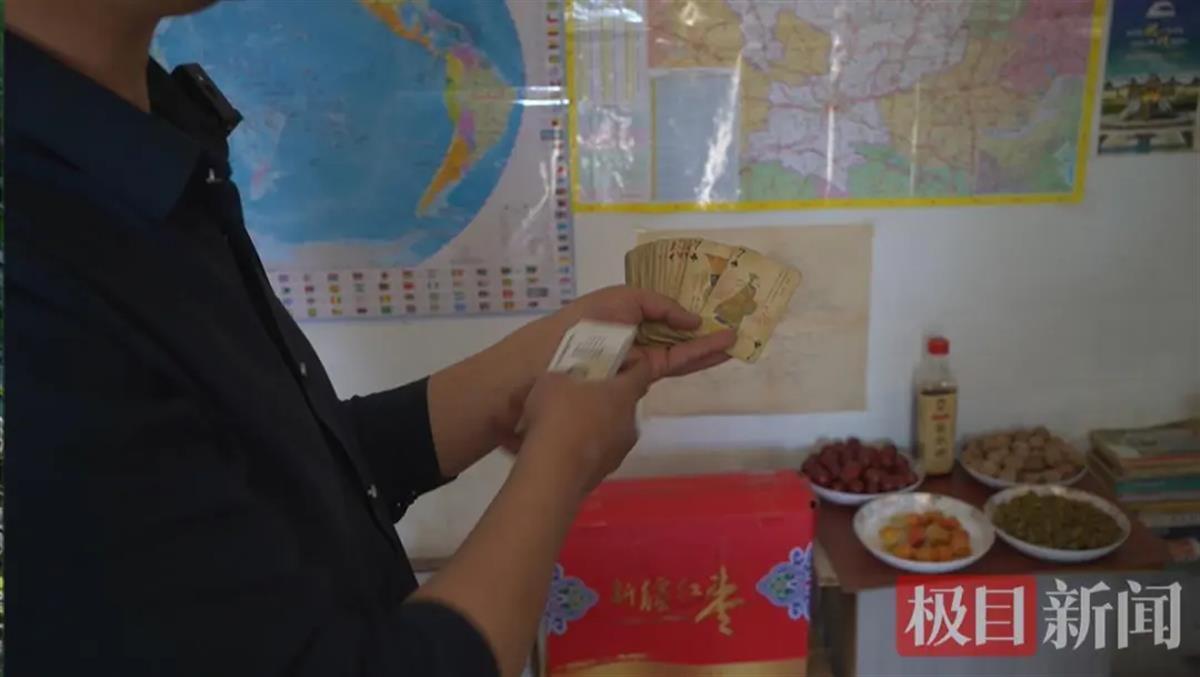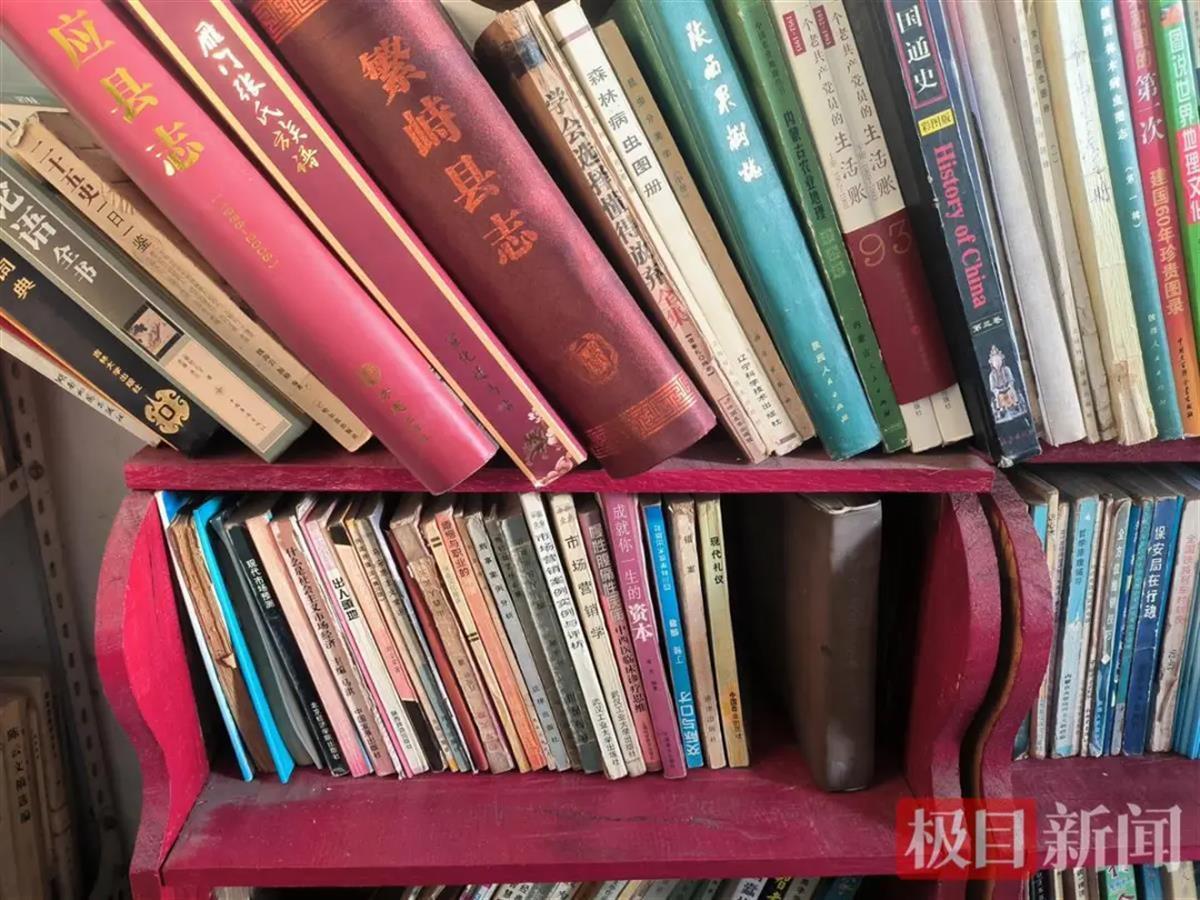“在墙上写下心事”的老农之子:满院子字迹是父亲另一种形式的陪伴
An Old Farmer’s Son: Father’s Writings On the Wall Will Always Be with Me
极目新闻记者 沈外 李迎
翻译:史亚翔,龚佳玉,卫拉(湖北大学)
Jimu News reporters: Shen Wai, Li Ying
Translators: Shi Yaxiang, Gong Jiayu, Lisa M.K
77岁的张福青走了,告别了他的祖屋和杏花,告别了写在墙上的满院字迹。
77-year-old Zhang Fuqing has passed away, bidding farewell to his family home, the long awaited apricot blossoms, and the writings that filled the walls.
生前,这位来自山西代县峨口镇上高陵村的农民,曾将心事写满整个院子:小到房屋修缮、农事安排、借款等日常琐事,大到对世界的好奇、对宇宙的追问。
Before his passing, Zhang, a farmer from Gaoling Village, E’kou Town, Daixian County, Shanxi Province, filled his entire courtyard with his reflections and ideas: from household repairs, farming schedules, loans, and other trivial affairs from his daily life, to his curiosity about the world and the universe.
2024年清明节前,摄影师蔡山海偶然经过张福青的葬礼,他拍下院子的照片发在社交媒体上,老人的满院心事一朝被外界知晓,引发广泛关注。
Before the Qingming Festival in 2024, photographer Cai Shanhai happened upon Zhang’s funeral. He took photos of the courtyard and posted them on social media, revealing to the world the elderly man’s thoughts which later sparked widespread online attention.
老人去世后,他的大儿子张宏刚、小儿子张宏英回到祖屋,开始整理父亲的遗物:年轻时骑的自行车、买过的地图册、写过的日记、抄过的书……更多属于福青的东西被翻了出来,连同这位古稀老人过往的人生片段。
After his passing, his eldest son, Zhang Honggang, and youngest son, Zhang Hongying, returned to their family home to sort through their father’s belongings: the bicycle he rode when he was young, maps he bought, diaries he wrote, and books he copied. More items along with his memories were unearthed.
墙上的字迹像一个索引,两个儿子开始重新回看父亲留下的字迹和遗物,并在回忆中重新理解了他。
The writings on the walls served as an index, prompting the two sons to revisit the items their father left, through which they gained a renewed understanding of him.
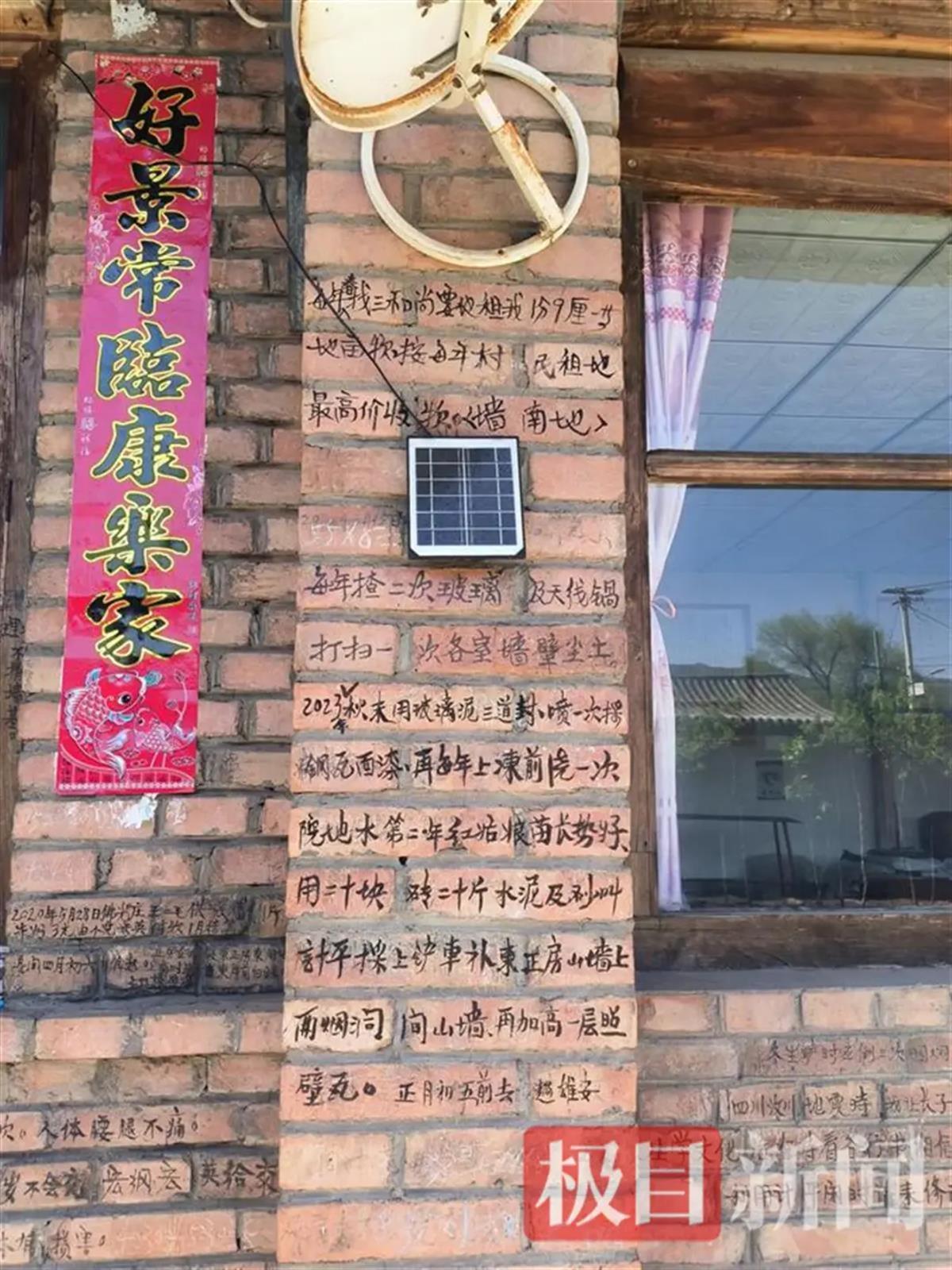
张福青写在墙上的文字(极目新闻记者李迎摄) Zhang Fuqing’s writings on the wall (Photo by Jimu News reporter Li Ying)
父亲善于表达,性格耿直
A Frank and Articulate Father
极目新闻:父亲是什么时候去世的?听到噩耗的第一反应是怎样的?
Jimu News: When did your father pass away? What was your initial reaction upon hearing the news?
张宏英:父亲是今年3月末去世的,当时我在北京。接到我哥电话的一瞬间就蒙了,不敢相信。今年过年后,我从家离开,那时他还好好的,完全看不出任何异常。
Zhang Hongying: My father passed away at the end of this March. I was in Beijing at that time. The moment I received my brother’s phone call, I was dumbfounded and could not believe it. He was perfectly fine, showing no signs of any illness, when I left home after the Chinese New Year earlier this year.
但我父亲有心脏方面的疾病。2008年他确诊了冠心病,2018年入院接受心脏支架手术,两年之后又做了一次心脏支架手术。
But my father had heart problems. He was diagnosed with coronary heart disease in 2008, underwent heart stent surgery in 2018, and had another same surgery two years later.
那天接完我哥的电话,我连夜从北京坐火车赶回家,到家后看见父亲已经躺在棺木里了。
After my brother’s call, I took a train from Beijing overnight and rushed back home. When I arrived home, I saw my father lying in the coffin.
张福青父子三人(极目新闻记者唐佳燕翻拍) Zhang Fuqing and his two sons (Photo by Jimu News reporter Tang Jiayan)
极目新闻:印象里父亲是怎样的人?
Jimu News: What was your impression of your father?
张宏刚:我父亲很善于表达,性格比较耿直,爱打抱不平。
他对我们很严厉。从小就教育我们要诚信、要与人和睦相处,还要求我们要正直善良。他做事有自己的风格,他觉得“只要我喜欢,我就做这个事”,不在意别人的看法。
Zhang Honggang: My father was a frank and articulate man. He stood up for justice and was strict with us. From a young age, he taught us to be honest, to get along with others, and to be upright and kind. He had his own style of doing things. He held that he would do it as long as he liked it regardless of the opinions of others.
我父亲很重视教育。他小时候念过私塾,上过“高小”,学习很认真,但那时家里贫困,没有条件供他读完书。
My father valued education greatly. He attended a private school and a primary school when he was young, and he studied diligently. My family was poor at that time, however, and there was not enough money for him to complete his education.
所以到我们上学时,他很希望我们能满足他小时候读书的心愿。在学习方面,他对我们要求很严格。
So when it was our turn to go to school, he hoped that we could fulfill his childhood dream of completing school. He was very strict with us in terms of schoolwork.
张宏英:我父亲比较喜欢接受新鲜事物,擅长学习,也喜欢出去旅游,每到一个新地方他都会去买当地的城市地图。
Zhang Hongying: My father was open to new things, good at learning, and enjoyed traveling. Whenever he visited a new place, he would buy a map of the city.
2017年我带他和我母亲去北京玩了一个星期,那一次去了故宫、圆明园、颐和园,他特别开心。他去过的最远的地方是广西北海,和我哥一起坐飞机去的,那是他第一次也是唯一一次坐飞机。
I took him and my mother to Beijing for a week in 2017. During that trip, we visited the Forbidden City, the Old Summer Palace, and the Summer Palace, and he was very excited. The farthest place he had been to was Beihai City of Guangxi Province, where he flew with my brother. That was his first and only time flying.
父亲很关心我,我在北京打工,每一次他和我打电话,都会问我住的地方好不好、和同事相处得好不好。他也挂念我的未来和前途,怕我“走歪路”,每次在村里听到有谁家孩子“不学好”,他都会打电话反复叮嘱我要踏实工作,好好生活。
Father cared a lot about me. I work in Beijing, and every time he called me, he would ask about my living situation, and if I got along well with my colleagues. He also worried about my future, afraid that I might “stray from the right path”. Whenever he heard about any child in the village show “bad behaviour”, he would repeatedly remind me over the phone to work diligently and live a good life.
极目新闻:父亲平时有什么兴趣爱好吗?
Jimu News: Did your father have any hobbies or interests?
张宏刚:父亲喜欢读书。在我小时候,他就一摞摞往家里买书,那个年代买书是一件很奢侈的事情,因为我家书多,那时候村里同龄的小孩经常来我家看书。
Zhang Honggang: My father enjoyed reading. When I was a child, he used to bring piles of books home. Buying books was a luxury back then, but because we had many books at home, kids from the village of the same age often came to our house to read.
他保持了一辈子读书的习惯。哪怕后来他开始种地,他也会买回各种各样的农业相关的书籍来学习,比如《农村实用手册》《果树栽培学》之类的。父亲在院子里种的红姑娘草药算是他学习后“引进”的品种,他是村里第一个种红姑娘草药的人。每年红姑娘成熟的时候,我都会从内蒙古回来,帮他把红姑娘摘下来,再帮他拿出去卖。
He maintained the habit of reading throughout his life. Even when he started farming later on, he would still buy various agricultural books to study, such as Practical Manual for Rural Areas and Fruit Tree Cultivation. The Franchet Groundcherry Calyx and Fruit he planted in the yard can be considered a species he “imported” after studying about it. He was the first person in the village to plant this herbal plant. Every year when the Franchet Groundcherry Calyx and Fruit matured, I would come back from Inner Mongolia to help him harvest it and then help him sell it.
张福青购买的农业书籍(极目新闻记者李迎摄) Agricultural books purchased by Zhang Fuqing (Photo by Jimu News reporter Li Ying)
张宏英:父亲喜欢看地图、收藏地图,每隔几年他就要买最新版的地图册,有时候买不到,还要我们帮忙买,版本买错了还要重买。他很关心地理和交通,经常说“要想富,先修路”,他觉得交通地理的状况代表一个地方的发展。
Zhang Hongying: My father loved looking at maps and collecting them. Every few years, he would buy the latest edition of an atlas. Sometimes if he couldn't find one, he would ask us to buy it, and if he bought the wrong version, he would buy it again. He cared a lot about geography and transportation, often saying “Building the road is the first step to become rich”. He believed that the state of transportation represents the development of a place.
他在家时经常把地图册随身带着,睡觉时就放在床头。有时候在电视里看到什么时事新闻,他就直接记在地图册上,他非常关心国家大事,比如一个地方的能源、交通、产业发展等问题。
He would often carry the atlas with him at home, and place it by his bedside when he slept. Sometimes when he saw current news on TV, he would directly note it on the atlas. He cared deeply about national affairs, such as the energy, transportation, and industrial development of different regions.
希望后辈维修好祖屋
Hope the descendants will repair the family home
极目新闻:父亲是什么时候开始在墙上写字的?
Jimu News: When did your father start writing on the wall?
张宏刚:最早应该是在1996年左右,那时他开始整修祖屋和院子。
Zhang Honggang: It should be around 1996 when he started renovating the family home and courtyard.
以前的院子是土墙,没法写字。整修后变成了砖墙,他就开始陆陆续续在上面写字,后来越写越多。一开始只在院墙写,后来房梁上、木门上、门槛上,包括顶门用的木头上,都有他的字迹。
The courtyard used to have mud walls, so he couldn't write on them. After the renovation, brick walls were installed, and he began to write on them intermittently, and overtime, he wrote more. At first, he only wrote on the courtyard walls, but later, he began writing on the beams, wooden doors, thresholds, and even the wood used for the top door had his handwriting.
为了防止日晒雨淋,他写完以后还在字的表面涂上清漆。这样字可以保留得更久远,他可能想把这些字留给我们,让我们很多年以后还能看见他留下的字迹。
To prevent sun and rain damage, he would apply clear varnish on the surface after each writing. This way, the writings could be preserved for a longer time. Perhaps he wanted to leave these writings for us, so that many years later, we could still see the traces he left behind.
极目新闻:你们了解过父亲为什么要在墙上写字吗?
Jimu News: Have you ever understood why your father wrote on the wall?
张宏刚:一个是为了记录。有时,某些事情他记不住,他就把这些日常琐事写在墙上提醒自己,比如修建房屋、种地,还有记账等。
Zhang Honggang: One reason is for record-keeping. Sometimes, if he couldn't remember certain details, he would write them on the wall to remind himself when it came to building and renovating the house, farming, and keeping accounts.
另一个是为了告诫我们。墙上有很多文字是留给我们兄弟俩的,比如告诉我们要乐观、要孝顺。还有很多内容是告诉我们怎样维护这间祖屋的,他想让我们保护这个屋子。我们这个院子是祖上传下来的,至今100多年了,我父亲对这个院子、对祖屋有感情,他一直是一个家族观念比较重的人,所以他希望我们兄弟俩能好好保护这间院子。
Another reason is to admonish us. Many of the writings on the wall are for our two brothers, reminding us to be optimistic and filial. There is also a lot of content instructing us on how to maintain this family home. He wants us to protect this house. This courtyard has been passed down from our ancestors for over 100 years. My father has feelings for this courtyard and the family home. He has always been someone who values family, so he hopes that my brother and I can take good care of this courtyard.
张宏英:小时候曾经问过,他回答“以后你们就明白了”。后来他越写越多,我也就习惯了。后来觉得,他在墙上记下这些,应该是为了给我们留一个念想。
Zhang Hongying: When I was young, I used to ask why, and he would say, “You'll understand when you're older.” Later on, the more he wrote, I soon grew accustomed to it. Eventually, I realized all that he had done must have been to leave us something to ponder over.
极目新闻:自从父亲走后,你们回到祖屋里整理他的遗物,有印象比较深刻的东西吗?
Jimu News: Since your father passed away, when you returned to the family home to sort through his belongings, were there any memorable items?
张宏刚:印象最深刻的是一副扑克牌,应该是我上小学之前我父亲买回来的。那副扑克牌上面印着唐诗宋词,那时候上面印诗词的扑克牌很少见,我父亲从别人那里看到了这副扑克牌,他觉得好,于是他也花大价钱买了一副,想让我在玩的时候也接受诗词文学的熏陶。
Zhang Honggang: The most memorable was a deck of cards, which my father must have bought before I started elementary school. The deck featured Tang and Song dynasty poetry, which was quite rare on playing cards back then. My father saw this deck somewhere and liked it, so he spent a lot of money to buy one, hoping to expose me to poetry and literature when I played with the cards.
我还在父亲的遗物中找到了我们小时候他买回来的小人书、连环画,这些都在他的箱子底,没想到过了这么久他还保存着。
I also found some comic books and picture books that my father bought for us when we were kids, all tucked away at the bottom of his trunk. It's surprising that he kept them for so long.
令张宏刚印象深刻的扑克牌(极目新闻记者唐佳燕摄) The playing cards were Zhang Honggang’s most memorable find.(Photo: Jimu News Reporter Tang Jiayan)
极目新闻:父亲写在院子里的字迹被摄影师拍摄下来,发在网上后火了,当时摄影师是怎样发现父亲的院子的?之前想过这些文字会引起这么多关注吗?
Jimu News: The writings your father left on the walls of the courtyard went viral after being photographed and shared online. How did the photographer discover your father's writings? Did you ever imagine that these words would get so much attention?
张宏英:完全没想过会火。清明节时我们在给父亲举办葬礼,那个摄影师正好路过村子,他想了解我们当地办红白喜事的风俗,于是就进来了,那时我们第一反应比较惊讶,“怎么有个带相机的人进来了?”他进来以后,看到墙上的文字也非常惊讶,在征得我们同意后他拍摄下了那些照片。
Zhang Hongying: We never imagined it would go viral. During the Qingming Festival, while we were holding a funeral for my father, the photographer happened to pass by the village. He wanted to learn about the local customs for weddings and funerals, so he came in. Initially, we were surprised, wondering, “Why is there someone with a camera here?” Once inside, he was equally surprised to see the writings on the walls. After we gave our consent, he took those photos.
另一种形式的陪伴
Another kind of companionship
极目新闻:有些网友认为,在这样一个闭塞的村子里,一个老人在墙上日复一日地写下文字,侧面反映他很孤独。你怎么看待这种说法?
Jimu News: Some netizens believe that in such a far-arriving village, an old man writing on the walls day after day reflects his loneliness. What are your thought on such comments?
张宏英:我觉得我父亲是有些孤独的,尤其这几年,我和我哥一个在内蒙古一个在北京,每年回来的次数比较少。虽然我们经常打电话,但是作为子女,没办法一直陪伴在老人身边。
Zhang Hongying: I do think my father was somewhat lonely, especially in recent years. My brother and I, one in Inner Mongolia and the other in Beijing, didn't come back home very often. Although we called him frequently, we couldn't be by his side all the time.
另一方面,他和村里差不多年龄的老人可能聊不到一起去,别人都喜欢聊一些家长里短的事情,他不怎么聊这些,他关心的那些事情别人也不感兴趣。
On the other hand, he probably couldn't make friends with other elderly people in the village. They liked to chat about trivial matters within the community, which he wasn't interested in. The things he cared about weren't of much interest to others.
儿子整理出的张福青的书籍(极目新闻记者李迎摄) Zhang Fuqing’s son arranges his late father’s bookshelf.(Photo by Jimu News Reporter Li Ying)
极目新闻:你去父亲的坟前看“他”时哭了,当时想到什么了呢?
Jimu News: You cried when you visited “your father” at his grave. What were you thinking at that moment?
张宏英:想到了我小时候父亲带我去祭祖的场景,他一个人就坐在我爷爷的坟前,一句话也不说。那时我特别不理解他为什么那样。我父亲很少哭,但我见过他在我爷爷坟前哭。刚刚我在他的坟前,一下完全理解他那时的心情。
Zhang Hongying: I thought about when my father used to take me to worship our ancestors. He would sit alone in front of my grandfather's grave, not saying a word. At that time, I couldn't understand his actions. My father seldom cried, but I saw him cry in front of my grandfather's grave. Standing at my father’s grave just now, I completely understood his emotions at that time.
极目新闻:现在再看到他留下的满院的字迹,会想些什么呢?
Jimu News: Now, when you see the writings he left all over the courtyard, what comes to mind?
张宏英:每一面墙上的字,现在看都是一种回忆,这些字迹还原了他的人生。对我来说,这是父亲换了另一种方式继续陪伴着我们。
Zhang Hongying: Each inscription on the walls is a memory, a window into his life. To me, it's like my father finding another way to continue being present in our lives.
(来源:极目新闻)
更多精彩资讯请在应用市场下载“极目新闻”客户端,未经授权请勿转载,欢迎提供新闻线索,一经采纳即付报酬。24小时报料热线027-86777777。


